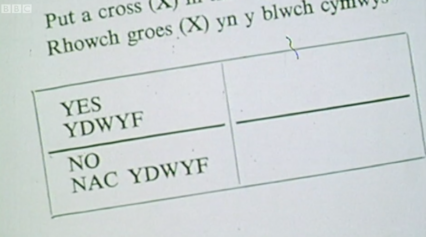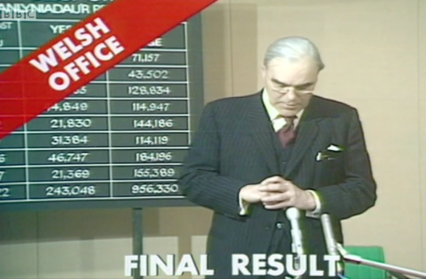Adam Somerset explores the wider context and reverberations as BBC’s Sunday Politics looks back 40 years to the first Devolution Referendum.
Wales and its media make for an incendiary mix in 2019. Nick Stradling wrote an article about film for Nation Cymru in February that had the headline “While Wales remains invisible on the silver screen no one will know who we are.” Gareth Leaman attacked “a perfect summation of ‘official Welsh culture’ at present: no real representation of ourselves on screen; a superficial idealisation of the natural landscape; exploitation of crumbling socio-political structures in his article on Netflix’s Sex Education in (Wales Arts Review in January. Delyth Jewell, new to the Shadow Culture brief, took to the television series Pitching In with a critical sledge-hammer.
 Forty years ago relations between authority and activists were at another level altogether. On 6th March 1979 the Member for Merioneth, then Mr. D. E. Thomas, reminded the House of Commons during a debate on broadcasting about two of his compatriots: “Wynford James and Rhodri Williams are imprisoned in Swansea for a conspiracy offence connected with interference with broadcasting installations.” The now Minister in the Welsh Government also pointed to the media deficit in the Referendum that had taken place five days before on Saint David’s Day: “Certainly one of the factors in the referendum must have been the fact that at least 30 per cent. of the estimated number of viewers of television in Wales view from transmitters based outside Wales. As a result, in no way could they participate in the general referendum debate.”
Forty years ago relations between authority and activists were at another level altogether. On 6th March 1979 the Member for Merioneth, then Mr. D. E. Thomas, reminded the House of Commons during a debate on broadcasting about two of his compatriots: “Wynford James and Rhodri Williams are imprisoned in Swansea for a conspiracy offence connected with interference with broadcasting installations.” The now Minister in the Welsh Government also pointed to the media deficit in the Referendum that had taken place five days before on Saint David’s Day: “Certainly one of the factors in the referendum must have been the fact that at least 30 per cent. of the estimated number of viewers of television in Wales view from transmitters based outside Wales. As a result, in no way could they participate in the general referendum debate.”
The 80% defeat of the Labour government policy on devolution is subject of a brief but full feature for BBC Wales for the Sunday Politics programme. Bethan James’ report opens with the Clash on the soundtrack. The visuals are of punk, mass meetings and marches of government employees on strike. John Morris, Lord Morris of Aberavon, Welsh Secretary of State 1974-1979 is the first interviewee. He describes how he persuaded the Cabinet to make devolution the flagship legislation for the year. But, then as now, minority government had small control over the back benches. Morris: “None of us wanted a referendum. None of us ever dreamt of a referendum. As it turned out, of course, it was a complete disaster for both countries and devolution was delayed for more than eighteen years.”
Donald Anderson, Lord Anderson of Swansea, was MP from 1974-2005 for Swansea East. He campaigned against the government. “Ordinary folks rejected it,” he says, “not convinced. It was ill thought through. It was a slogan… not a policy.” “A crushing defeat for a crumbling government”, adds the voice-over of Bethan James.
Baroness Randerson: “It was obvious to me that it wasn’t going to work that time, there wasn’t the enthusiasm and although the people of Wales found plenty to complain about they did not think devolution was the answer.” Dafydd Wigley, reports James, was “crestfallen but not surprised.” “There was a question,” he says in interview in 2019, “whether Plaid Cymru should have been emotionally so attached to a model of devolution that was very much weaker than had been anticipated at the start of the process.”
“It was as if we had accepted every dilution of the proposal as it went on. Looking back there were people, like the late Professor Phil Williams, who warned us “don’t go with this. You’ll only get devolution from a Labour government when they have their own people supporting their own party and they didn’t in 1979.”
That March of 1979 was the most febrile of political months. Four weeks after the day of referendum, the Labour government fell by one vote. History is not a comfort blanket. In 2019 Plaid and the Scottish National Party are strong allies, tabling amendments in the interests of their own nations. In 1979 they divided, Plaid siding with Labour and the SNP voting with Mrs Thatcher. On May 3rd nine of the eleven SNP Members were unseated.
Devolution forty years on is a fact but also a work-in-progress. Rhodri Morgan made his political adieu in a speech at the Wales Political Archive in Aberystwyth. He was asked as to the achievement of the first stage of devolved government. The response was that the first task of the Senedd had been simply its legitimation as a part of national life. The second stage – “the Carwyn Years”- was assessed in December by Radio Wales and the Western Mail. The next crucial step begins next month. From 6 April 2019 a proportion of income tax paid by taxpayers living in Wales will be transferred straight to the Welsh Government to fund Welsh public services. The progress continues.











